六年级英语关于节日活动的句型整理2018
- 格式:docx
- 大小:19.69 KB
- 文档页数:3
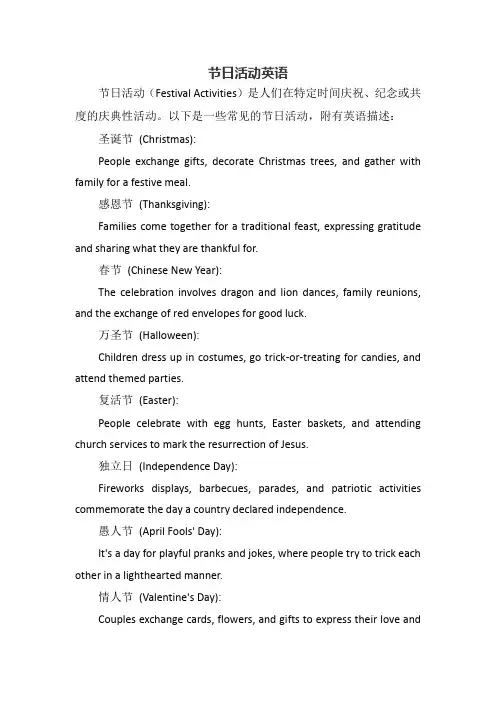
节日活动英语节日活动(Festival Activities)是人们在特定时间庆祝、纪念或共度的庆典性活动。
以下是一些常见的节日活动,附有英语描述:圣诞节(Christmas):People exchange gifts, decorate Christmas trees, and gather with family for a festive meal.感恩节(Thanksgiving):Families come together for a traditional feast, expressing gratitude and sharing what they are thankful for.春节(Chinese New Year):The celebration involves dragon and lion dances, family reunions, and the exchange of red envelopes for good luck.万圣节(Halloween):Children dress up in costumes, go trick-or-treating for candies, and attend themed parties.复活节(Easter):People celebrate with egg hunts, Easter baskets, and attending church services to mark the resurrection of Jesus.独立日(Independence Day):Fireworks displays, barbecues, parades, and patriotic activities commemorate the day a country declared independence.愚人节(April Fools' Day):It's a day for playful pranks and jokes, where people try to trick each other in a lighthearted manner.情人节(Valentine's Day):Couples exchange cards, flowers, and gifts to express their love andaffection for each other.感恩日(Labor Day):Honoring the contributions of workers, this day often involves parades, picnics, and various recreational activities.新年庆祝(New Year's Celebration):Countdowns, fireworks, parties, and resolutions mark the transition from the old year to the new.这些活动在不同文化中有着丰富多彩的庆祝方式,每个节日都有其独特的文化意义。
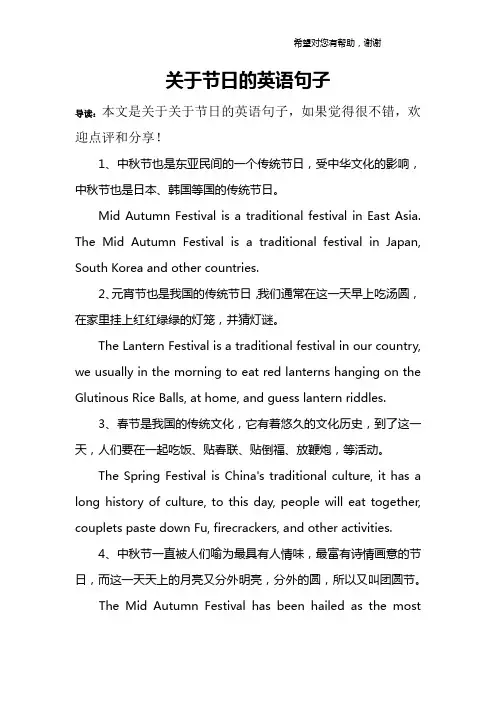
关于节日的英语句子导读:本文是关于关于节日的英语句子,如果觉得很不错,欢迎点评和分享!1、中秋节也是东亚民间的一个传统节日,受中华文化的影响,中秋节也是日本、韩国等国的传统节日。
Mid Autumn Festival is a traditional festival in East Asia. The Mid Autumn Festival is a traditional festival in Japan, South Korea and other countries.2、元宵节也是我国的传统节日,我们通常在这一天早上吃汤圆,在家里挂上红红绿绿的灯笼,并猜灯谜。
The Lantern Festival is a traditional festival in our country, we usually in the morning to eat red lanterns hanging on the Glutinous Rice Balls, at home, and guess lantern riddles.3、春节是我国的传统文化,它有着悠久的文化历史,到了这一天,人们要在一起吃饭、贴春联、贴倒福、放鞭炮,等活动。
The Spring Festival is China's traditional culture, it has a long history of culture, to this day, people will eat together, couplets paste down Fu, firecrackers, and other activities.4、中秋节一直被人们喻为最具有人情味,最富有诗情画意的节日,而这一天天上的月亮又分外明亮,分外的圆,所以又叫团圆节。
The Mid Autumn Festival has been hailed as the mosthumane, the richest of the festival a quality suggestive of poetry or painting and to this day, the moon is particularly bright, exceptionally round, so it is also called the festival of reunion.5、中秋里说感恩真是一个绝妙的创意,人们说感恩之水从心田流淌;人们说中秋之节源于真情洋溢。
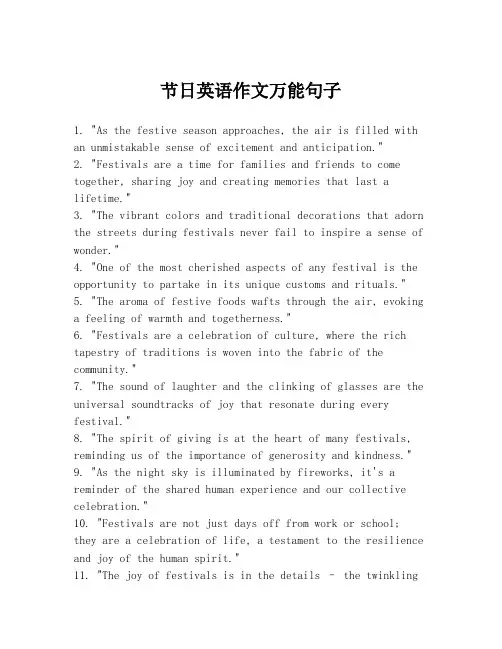
节日英语作文万能句子1. "As the festive season approaches, the air is filled with an unmistakable sense of excitement and anticipation."2. "Festivals are a time for families and friends to come together, sharing joy and creating memories that last a lifetime."3. "The vibrant colors and traditional decorations that adorn the streets during festivals never fail to inspire a sense of wonder."4. "One of the most cherished aspects of any festival is the opportunity to partake in its unique customs and rituals."5. "The aroma of festive foods wafts through the air, evokinga feeling of warmth and togetherness."6. "Festivals are a celebration of culture, where the rich tapestry of traditions is woven into the fabric of the community."7. "The sound of laughter and the clinking of glasses are the universal soundtracks of joy that resonate during every festival."8. "The spirit of giving is at the heart of many festivals, reminding us of the importance of generosity and kindness."9. "As the night sky is illuminated by fireworks, it's a reminder of the shared human experience and our collective celebration."10. "Festivals are not just days off from work or school; they are a celebration of life, a testament to the resilience and joy of the human spirit."11. "The joy of festivals is in the details – the twinklinglights, the melodic tunes, and the heartfelt greetings exchanged."12. "Every festival has its own story, and it's the retelling of these stories that brings people together in a bond of shared history."13. "The countdown to the festival is always filled with a mix of preparation and eagerness, as everyone looks forward to the celebrations."14. "Festivals are a time to reflect on the past and look forward to the future, with hope and optimism."15. "No matter where you are in the world, the common thread of celebration during festivals unites us all in the spirit of unity and peace."。
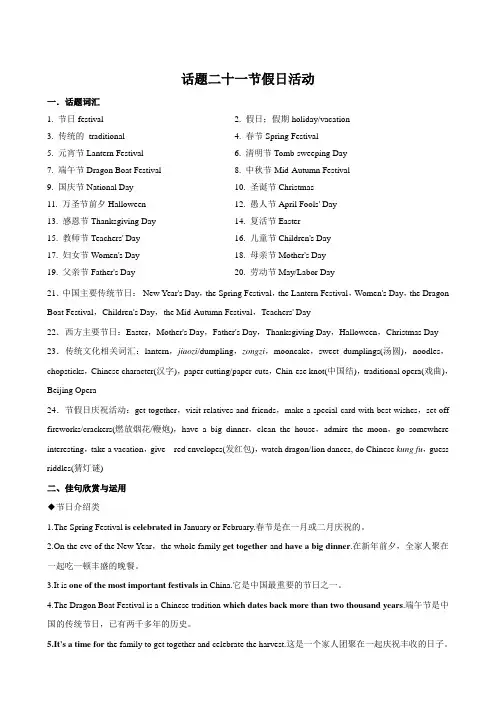
话题二十一节假日活动一.话题词汇1. 节日festival2. 假日;假期holiday/vacation3. 传统的traditional4. 春节Spring Festival5. 元宵节Lantern Festival6. 清明节Tomb-sweeping Day7. 端午节Dragon Boat Festival8. 中秋节Mid-Autumn Festival9. 国庆节National Day10. 圣诞节Christmas11. 万圣节前夕Halloween 12. 愚人节April Fools' Day13. 感恩节Thanksgiving Day14. 复活节Easter15. 教师节Teachers' Day16. 儿童节Children's Day17. 妇女节Women's Day 18. 母亲节Mother's Day19. 父亲节Father's Day20. 劳动节May/Labor Day21.中国主要传统节日:New Year's Day,the Spring Festival,the Lantern Festival,Women's Day,the Dragon Boat Festival,Children's Day,the Mid-Autumn Festival,Teachers' Day22.西方主要节日:Easter,Mother's Day,Father's Day,Thanksgiving Day,Halloween,Christmas Day 23.传统文化相关词汇:lantern,jiaozi/dumpling,zongzi,mooncake,sweet dumplings(汤圆),noodles,chopsticks,Chinese character(汉字),paper cutting/paper-cuts,Chin-ese knot(中国结),traditional opera(戏曲),Beijing Opera24.节假日庆祝活动:get together,visit relatives and friends,make a special card with best wishes,set off fireworks/crackers(燃放烟花/鞭炮),have a big dinner,clean the house,admire the moon,go somewhere interesting,take a vacation,give red envelopes(发红包),watch dragon/lion dances, do Chinese kung fu,guess riddles(猜灯谜)二、佳句欣赏与运用◆节日介绍类1.The Spring Festival is celebrated in January or February.春节是在一月或二月庆祝的。
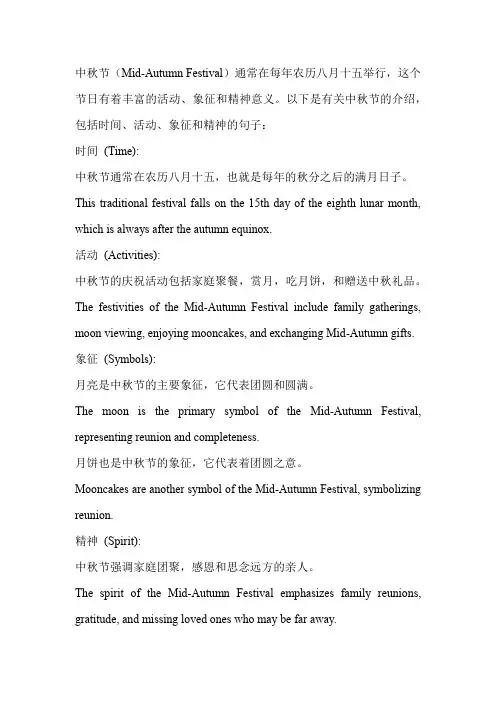
中秋节(Mid-Autumn Festival)通常在每年农历八月十五举行,这个节日有着丰富的活动、象征和精神意义。
以下是有关中秋节的介绍,包括时间、活动、象征和精神的句子:时间(Time):中秋节通常在农历八月十五,也就是每年的秋分之后的满月日子。
This traditional festival falls on the 15th day of the eighth lunar month, which is always after the autumn equinox.活动(Activities):中秋节的庆祝活动包括家庭聚餐,赏月,吃月饼,和赠送中秋礼品。
The festivities of the Mid-Autumn Festival include family gatherings, moon viewing, enjoying mooncakes, and exchanging Mid-Autumn gifts.象征(Symbols):月亮是中秋节的主要象征,它代表团圆和圆满。
The moon is the primary symbol of the Mid-Autumn Festival, representing reunion and completeness.月饼也是中秋节的象征,它代表着团圆之意。
Mooncakes are another symbol of the Mid-Autumn Festival, symbolizing reunion.精神(Spirit):中秋节强调家庭团聚,感恩和思念远方的亲人。
The spirit of the Mid-Autumn Festival emphasizes family reunions, gratitude, and missing loved ones who may be far away.这个节日也传承了中国的传统价值观,如孝顺和亲情。
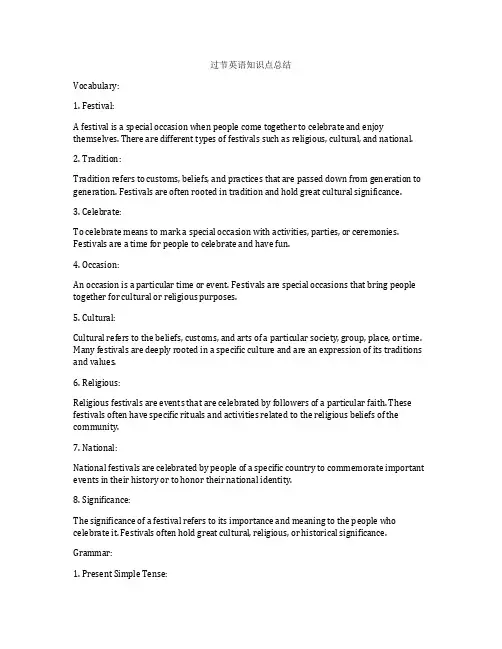
过节英语知识点总结Vocabulary:1. Festival:A festival is a special occasion when people come together to celebrate and enjoy themselves. There are different types of festivals such as religious, cultural, and national. 2. Tradition:Tradition refers to customs, beliefs, and practices that are passed down from generation to generation. Festivals are often rooted in tradition and hold great cultural significance.3. Celebrate:To celebrate means to mark a special occasion with activities, parties, or ceremonies. Festivals are a time for people to celebrate and have fun.4. Occasion:An occasion is a particular time or event. Festivals are special occasions that bring people together for cultural or religious purposes.5. Cultural:Cultural refers to the beliefs, customs, and arts of a particular society, group, place, or time. Many festivals are deeply rooted in a specific culture and are an expression of its traditions and values.6. Religious:Religious festivals are events that are celebrated by followers of a particular faith. These festivals often have specific rituals and activities related to the religious beliefs of the community.7. National:National festivals are celebrated by people of a specific country to commemorate important events in their history or to honor their national identity.8. Significance:The significance of a festival refers to its importance and meaning to the people who celebrate it. Festivals often hold great cultural, religious, or historical significance. Grammar:1. Present Simple Tense:The present simple tense is often used to talk about festivals, traditions, and customs that are repeated regularly. For example, "The Chinese celebrate the Lunar New Year with family gatherings and traditional foods."2. Adjectives:Adjectives are used to describe festivals and their characteristics. For example, "The Diwali festival is a colorful and joyous celebration of lights and good over evil."3. Prepositions:Prepositions are used to talk about the time, place, and purpose of festivals. For example, "People gather at the town square to celebrate the annual summer festival."4. Comparative and Superlative Adjectives:Comparative and superlative adjectives can be used to compare festivals and their significance. For example, "The Mid-Autumn Festival is one of the most important festivals in Chinese culture."5. Modal Verbs:Modal verbs can be used to express the significance and importance of festivals. For example, "The harvest festival must be celebrated with gratitude for the abundance of the land."Idioms and Phrases:1. Paint the town red:This idiom means to go out and have a great time, often at a festival or celebration.2. Let your hair down:This phrase means to relax and enjoy yourself, especially at a festive event.3. A full plate:This phrase refers to being very busy or having a lot of things to do, especially during a festival or holiday season.4. Ring in the New Year:This phrase means to celebrate the arrival of the new year with joy and festivities.5. Break the ice:This idiom means to start a conversation or ease tension, often at social gatherings or festivals.Cultural Knowledge:1. Different Types of Festivals:There are various types of festivals celebrated around the world based on religious, cultural, and national significance. Some examples include Christmas, Diwali, Chinese New Year, Hanukkah, Eid al-Fitr, Thanksgiving, and many more.2. Traditions and Customs:Festivals often involve specific traditions and customs that have been passed down through generations. These may include special foods, clothing, music, dances, and rituals that hold great cultural and historical significance.3. Symbolism:Festivals often include symbols and rituals that represent important cultural or religious themes. For example, the Christmas tree and the menorah are symbols of the Christmas and Hanukkah festivals, respectively.4. Festive Foods:Many festivals are associated with special foods and feasting. For example, mooncakes are eaten during the Mid-Autumn Festival, and turkey is a traditional dish for Thanksgiving. 5. Festive Attire:People often dress in special attire or traditional clothing during festivals to show respect and participation in the cultural or religious event. For example, people wear traditional Chinese clothing during the Chinese New Year celebrations.6. Festive Music and Dance:Music and dance are important components of many festivals. They are used to create a joyful and celebratory atmosphere and to express cultural traditions and values. Significance and Importance:1. Community and Togetherness:Festivals bring people together and promote a sense of community, unity, and togetherness. They provide an opportunity for people to connect with each other and celebrate their shared traditions and values.2. Cultural Preservation:Festivals play a vital role in preserving and promoting cultural heritage. They provide a platform for the transmission of traditional knowledge, customs, and practices from one generation to the next.3. Religious Observance:Religious festivals are a time for spiritual reflection, prayer, and observance of religious customs and rituals. They hold great importance for religious communities and serve as a way to honor and express their faith.4. Historical Commemoration:National festivals often commemorate important events in a country's history, such as independence, revolution, or unity. They serve as a reminder of the struggles and triumphs that have shaped a nation's identity.Conclusion:In conclusion, festivals are a rich and integral part of human culture and society. They provide a platform for people to come together, celebrate, and honor their traditions, beliefs, and values. Through festivals, people can connect with their cultural roots, express their spirituality, and create lasting memories. Understanding the vocabulary, grammar, idioms, and cultural knowledge related to festivals is essential for effective communication and cultural appreciation in English. By learning about different festivals and their significance, one can gain a deeper understanding of the diverse and vibrant cultures that make up our world. As we continue to celebrate festivals, let us appreciate the beauty and significance of these cultural expressions and the sense of community and togetherness they bring.。
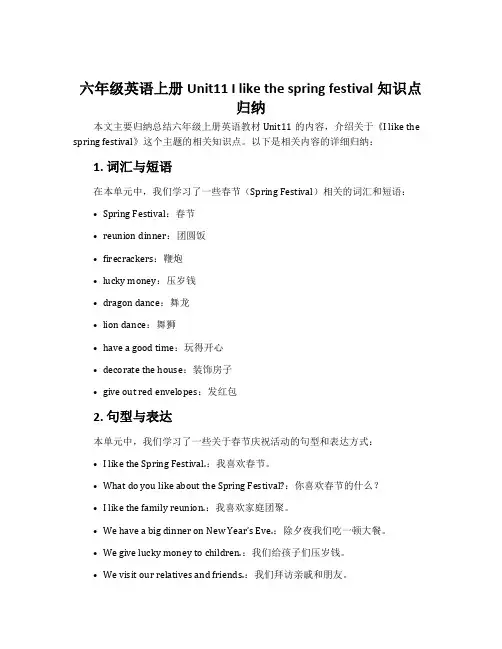
六年级英语上册Unit11 I like the spring festival知识点归纳本文主要归纳总结六年级上册英语教材Unit11的内容,介绍关于《I like the spring festival》这个主题的相关知识点。
以下是相关内容的详细归纳:1. 词汇与短语在本单元中,我们学习了一些春节(Spring Festival)相关的词汇和短语:•Spring Festival:春节•reunion dinner:团圆饭•firecrackers:鞭炮•lucky money:压岁钱•dragon dance:舞龙•lion dance:舞狮•have a good time:玩得开心•decorate the house:装饰房子•give out red envelopes:发红包2. 句型与表达本单元中,我们学习了一些关于春节庆祝活动的句型和表达方式:•I like the Spring Festival.:我喜欢春节。
•What do you like about the Spring Festival?:你喜欢春节的什么?•I like the family reunion.:我喜欢家庭团聚。
•We have a big dinner on New Year’s Eve.:除夕夜我们吃一顿大餐。
•We give lucky money to children.:我们给孩子们压岁钱。
•We visit our relatives and friends.:我们拜访亲戚和朋友。
•We decorate the house with red lanterns.:我们用红灯笼装饰房子。
•We set off firecrackers in the street.:我们在街上放鞭炮。
3. 语法点在本单元中,我们复习了以下一些语法点:3.1. 一般现在时一般现在时用来描述客观事实、习惯性动作、日常活动等。
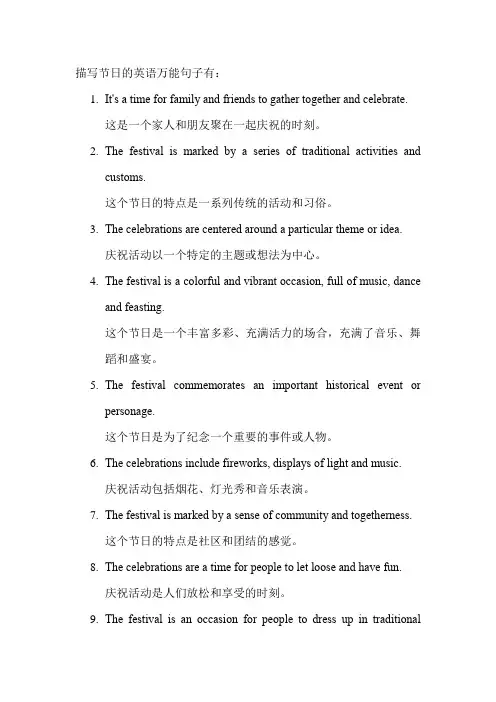
描写节日的英语万能句子有:1.It's a time for family and friends to gather together and celebrate.这是一个家人和朋友聚在一起庆祝的时刻。
2.The festival is marked by a series of traditional activities andcustoms.这个节日的特点是一系列传统的活动和习俗。
3.The celebrations are centered around a particular theme or idea.庆祝活动以一个特定的主题或想法为中心。
4.The festival is a colorful and vibrant occasion, full of music, danceand feasting.这个节日是一个丰富多彩、充满活力的场合,充满了音乐、舞蹈和盛宴。
5.The festival commemorates an important historical event orpersonage.这个节日是为了纪念一个重要的事件或人物。
6.The celebrations include fireworks, displays of light and music.庆祝活动包括烟花、灯光秀和音乐表演。
7.The festival is marked by a sense of community and togetherness.这个节日的特点是社区和团结的感觉。
8.The celebrations are a time for people to let loose and have fun.庆祝活动是人们放松和享受的时刻。
9.The festival is an occasion for people to dress up in traditionalcostumes and participate in cultural performances.这个节日是人们穿上传统服装,参加文化表演的时刻。
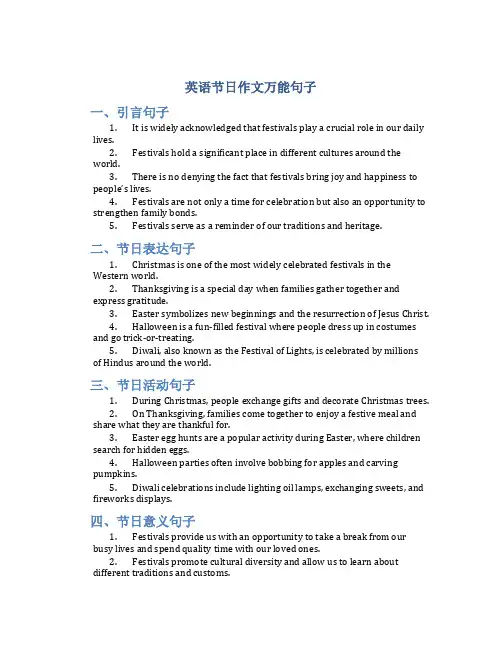
英语节日作文万能句子一、引言句子1.It is widely acknowledged that festivals play a crucial role in our daily lives.2.Festivals hold a significant place in different cultures around the world.3.There is no denying the fact that festivals bring joy and happiness to people’s lives.4.Festivals are not only a time for celebration but also an opportunity to strengthen family bonds.5.Festivals serve as a reminder of our traditions and heritage.二、节日表达句子1.Christmas is one of the most widely celebrated festivals in the Western world.2.Thanksgiving is a special day when families gather together and express gratitude.3.Easter symbolizes new beginnings and the resurrection of Jesus Christ.4.Halloween is a fun-filled festival where people dress up in costumes and go trick-or-treating.5.Diwali, also known as the Festival of Lights, is celebrated by millions of Hindus around the world.三、节日活动句子1.During Christmas, people exchange gifts and decorate Christmas trees.2.On Thanksgiving, families come together to enjoy a festive meal and share what they are thankful for.3.Easter egg hunts are a popular activity during Easter, where children search for hidden eggs.4.Halloween parties often involve bobbing for apples and carving pumpkins.5.Diwali celebrations include lighting oil lamps, exchanging sweets, and fireworks displays.四、节日意义句子1.Festivals provide us with an opportunity to take a break from our busy lives and spend quality time with our loved ones.2.Festivals promote cultural diversity and allow us to learn about different traditions and customs.3.Festivals create a sense of unity and bring communities together.4.Through festivals, we can uphold and preserve our cultural heritage.5.Festivals serve as a reminder of the importance of joy, love, and gratitude in our lives.五、个人体验句子1.My favorite festival is Christmas because of the warm atmosphere and the joy it brings to my family.2.Thanksgiving holds a special place in my heart as it allows me to reflect on the blessings in my life.3.I have fond memories of participating in Easter egg hunts with my siblings and cousins.4.Halloween is always a thrilling experience as I get to dress up and go trick-or-treating with my friends.5.Diwali is a festival that I look forward to every year as I enjoy the vibrant decorations and delicious sweets.六、结尾句子1.In conclusion, festivals are an integral part of our lives and contribute to our overall well-being.2.Festivals bring people together, spread joy, and create lasting memories.3.As we celebrate different festivals, let us appreciate the richness of our diverse cultures.4.Let us cherish the traditions and values that festivals represent and pass them on to future generations.5.May festivals continue to bring happiness and a sense of belonging to people all over the world.以上是关于英语节日作文万能句子的文档,希望对您有所帮助。
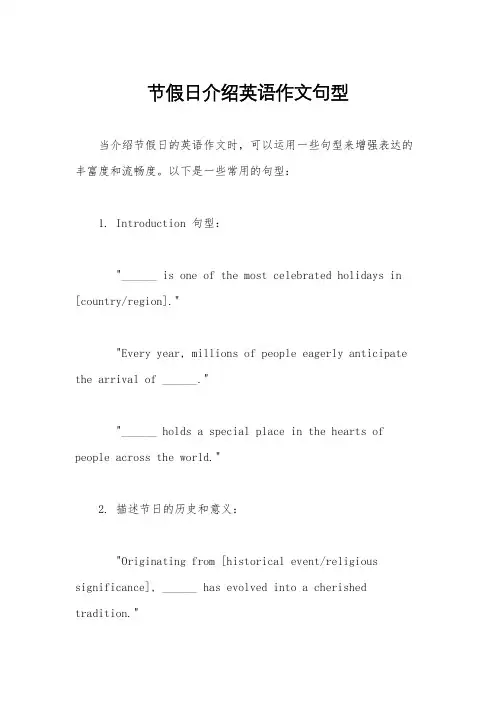
节假日介绍英语作文句型当介绍节假日的英语作文时,可以运用一些句型来增强表达的丰富度和流畅度。
以下是一些常用的句型:1. Introduction 句型:"______ is one of the most celebrated holidays in [country/region].""Every year, millions of people eagerly anticipate the arrival of ______.""______ holds a special place in the hearts of people across the world."2. 描述节日的历史和意义:"Originating from [historical event/religious significance], ______ has evolved into a cherished tradition.""The significance of ______ lies in its emphasis on [values/celebratory themes].""______ is a time-honored tradition that symbolizes [cultural beliefs/values]."3. 描述庆祝活动和仪式:"During ______, families and friends gather together to [activity], symbolizing [theme].""One of the hallmark traditions of ______ is [specific activity/ritual], which represents [meaning].""From [specific activity] to [another activity], the celebrations during ______ are vibrant and diverse."4. 分享个人体验或观点:"Personally, I find ______ to be a time of [reflection/joyful celebration].""Having participated in ______ for many years, I can attest to the sense of [community/spirituality] it fosters.""For me, the essence of ______ lies in [personal experience/reflection], which underscores the importance of [value/theme]."5. 总结句型:"In conclusion, ______ embodies the spirit of [theme/value] and brings people together in[celebration/unity].""Through its rich traditions and meaningful customs, ______ reminds us of the importance of [value/theme].""Ultimately, ______ serves as a time for[reflection/celebration] and reinforces the bonds of [community/family]."以上这些句型可以帮助你构建一个丰富而流畅的节假日介绍英语作文,让读者对节日有更深入的了解。
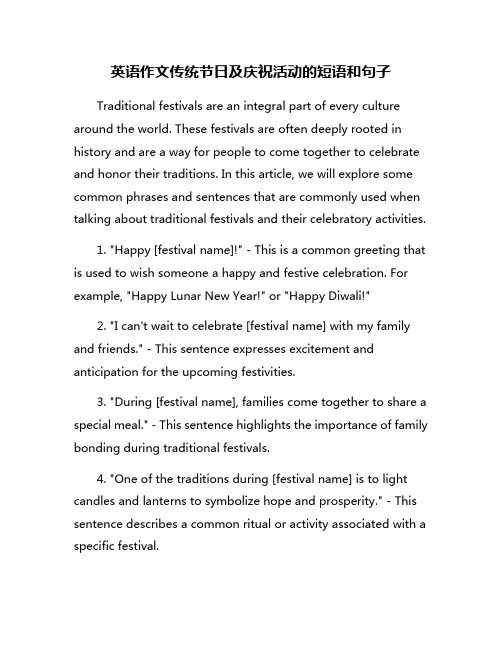
英语作文传统节日及庆祝活动的短语和句子Traditional festivals are an integral part of every culture around the world. These festivals are often deeply rooted in history and are a way for people to come together to celebrate and honor their traditions. In this article, we will explore some common phrases and sentences that are commonly used when talking about traditional festivals and their celebratory activities.1. "Happy [festival name]!" - This is a common greeting that is used to wish someone a happy and festive celebration. For example, "Happy Lunar New Year!" or "Happy Diwali!"2. "I can't wait to celebrate [festival name] with my family and friends." - This sentence expresses excitement and anticipation for the upcoming festivities.3. "During [festival name], families come together to share a special meal." - This sentence highlights the importance of family bonding during traditional festivals.4. "One of the traditions during [festival name] is to light candles and lanterns to symbolize hope and prosperity." - This sentence describes a common ritual or activity associated with a specific festival.5. "People wear traditional clothes and perform traditional dances during [festival name]." - This sentence emphasizes the cultural aspects of the festival, such as traditional attire and dance performances.6. "The streets are filled with colorful decorations and festive music during [festival name]." - This sentence paints a vivid picture of the festive atmosphere during a traditional festival.7. "Children enjoy receiving red envelopes filled with money during [festival name]." - This sentence describes a common tradition of giving money as a gift during certain festivals, such as Chinese New Year.8. "I love watching the fireworks display during [festival name]." - This sentence expresses enjoyment of a specific celebratory activity, such as fireworks.9. "It is a time to reflect on the past year and set intentions for the new year during [festival name]." - This sentence highlights the spiritual and reflective aspects of some traditional festivals.10. "I feel a sense of connection to my culture and heritage when celebrating [festival name]." - This sentence expresses theimportance of maintaining cultural traditions and honoring one's heritage through festive celebrations.In conclusion, traditional festivals are a time for people to come together to celebrate their culture, traditions, and heritage. By using these phrases and sentences, you can better express your appreciation for these celebrations and convey the spirit of festivity and unity that traditional festivals bring to communities around the world.。
英语课程节日与庆祝活动常用语英语课程中涉及到的节日和庆祝活动常常是学习的重要内容之一。
在交流和表达的过程中,使用准确和恰当的常用语可以更好地传达我们的思想和情感。
本文将介绍一些在英语课程中常用的节日和庆祝活动相关的常用语,以帮助你在口语和写作中更准确地表达自己。
1. 春节 (Chinese New Year)- 新年快乐!(Happy New Year!)- 恭喜发财!(Wishing you prosperity!)- 过年好!(Happy Spring Festival!)- 吃饺子是新年的传统。
(Eating dumplings is a tradition for the New Year.)2. 圣诞节 (Christmas)- 圣诞快乐!(Merry Christmas!)- 圣诞老人给我带来了礼物。
(Santa Claus brought me presents.)- 我们将举办圣诞晚会。
(We will host a Christmas party.)3. 感恩节 (Thanksgiving)- 感恩节快乐!(Happy Thanksgiving!)- 我们将和家人共度美好的时光。
(We will spend quality time with family.)- 我们要感谢的事情有很多。
(There are many things we should be thankful for.)4. 阳历新年 (New Year's Day)- 新年好!(Happy New Year!)- 我们要庆祝新的开始。
(We celebrate new beginnings.)- 我希望下一年充满幸福和成功。
(I hope the next year is filled with happiness and success.)5. 情人节 (Valentine's Day)- 情人节快乐!(Happy Valentine's Day!)- 我给你准备了一份特别的礼物。
英语作文节日万能句子1. "As the festive season approaches, the air is filled with the aroma of joy and anticipation."2. "Festivals are a time when families and friends come together to celebrate and create lasting memories."3. "The streets are adorned with colorful decorations,setting the stage for the celebration of the season."4. "The festive spirit is contagious, spreading happiness and warmth to everyone it touches."5. "The sound of laughter and the clinking of glasses echo through the air, marking the beginning of the festivities."6. "Festivals are a time for reflection, as we look back on the year gone by and look forward to the year ahead."7. "The festive lights twinkle in the night sky, casting a magical glow over the city."8. "The excitement of the festival is palpable, as people prepare for the celebrations with great enthusiasm."9. "The festival is a time to indulge in traditional foods, savoring the flavors that have been passed down through generations."10. "The festival is not just a celebration of the present but also a tribute to the rich cultural heritage of our ancestors."11. "As the festival draws to a close, the memories made will be cherished and the lessons learned will be carried forward."12. "Festivals are a testament to the resilience and unity of communities, as they come together to celebrate their sharedvalues."13. "The festival is a time to embrace the spirit of giving, as we share our blessings with those less fortunate."14. "The festival is a time to embrace the spirit of gratitude, as we express our thanks for the blessings we have received."15. "As the festival ends, we are left with a renewed sense of hope and a determination to make the coming year even better."These sentences can be adapted and incorporated into various English essays about festivals, providing a versatile set of expressions to enrich the writing.。
英语作文传统节日及庆祝活动的短语和句子Traditional festivals are an important part of acountry's culture and history. They are occasions for people to come together, celebrate, and carry on their cultural heritage. Here are some traditional festivals and their celebration activities in both English and Chinese:1. Spring Festival (春节)- The Spring Festival, also known as Chinese New Year, is the most important traditional festival in China.- People celebrate the Spring Festival by cleaning their houses, decorating with red lanterns and couplets, and setting off fireworks.- On the eve of the Spring Festival, families have a reunion dinner and watch the Spring Festival Gala on TV.- Children receive red envelopes containing money from their elders as a symbol of good luck.2. Mid-Autumn Festival (中秋节)- The Mid-Autumn Festival is a time for family reunions and appreciating the full moon.- People celebrate the Mid-Autumn Festival by eating mooncakes, a traditional pastry filled with sweet bean paste or lotus seed paste.- Families and friends gather to admire the moon, and children carry paper lanterns.3. Dragon Boat Festival (端午节)- The Dragon Boat Festival commemorates the death of the poet Qu Yuan and is celebrated with dragon boat races and the eating of zongzi, glutinous rice wrapped in bamboo leaves.- People also hang up calamus and wormwood to ward off evil spirits.4. Thanksgiving (感恩节)- Thanksgiving is a traditional festival in the United States and Canada where people give thanks for the harvest and blessings of the past year.- Families and friends gather for a special meal, usually featuring turkey, stuffing, and pumpkin pie.- It is also a time for expressing gratitude and giving back to the community through acts of charity.5. Diwali (排灯节)- Diwali, also known as the Festival of Lights, is a major festival in India celebrated with the lighting of oil lamps, fireworks, and the exchange of sweets and gifts.- People decorate their homes with colorful rangoli patterns and light up diyas (clay lamps) to symbolize the victory of light over darkness and good over evil.传统节日是一个国家文化和历史的重要组成部分。
六年级英语节日知识点归纳在我们的日常生活中,节日扮演着一个重要的角色。
无论是国庆节、圣诞节还是春节,每个节日都有其特定的意义和庆祝活动。
在六年级的英语学习中,了解一些节日知识,不仅可以帮助我们扩展词汇量,还可以增进对其他文化的理解。
下面是六年级英语节日知识点的归纳,希望能对同学们的学习有所帮助。
1. 春节 (Chinese New Year)- 时间:农历正月初一- 庆祝活动:贴春联、放鞭炮、拜年、吃团圆饭、舞龙舞狮、观看烟花等- 特色食物:春卷、饺子、年糕等2. 清明节 (Tomb-sweeping Day)- 时间:农历清明节前后- 庆祝活动:扫墓、祭祖、放风筝、野餐等- 习俗:吃清明团、划龙舟、踏青等3. 劳动节 (Labor Day)- 由来:为了纪念工人阶级的国际团结和斗争,以及争取劳动权益的斗争历史- 庆祝活动:放假、旅游、社区活动等4. 万圣节 (Halloween)- 时间:每年的10月31日- 起源:源于古代凯尔特人的庆祝盛会,现已成为西方国家的重要节日- 庆祝活动:戴面具、化妆、穿着万圣节服装、挂南瓜灯、参加派对、玩游戏等5. 感恩节 (Thanksgiving)- 时间:每年的11月的第四个星期四- 起源:美洲土著和早期移民庆祝丰收的传统- 庆祝活动:与家人朋友聚餐、吃火鸡、享受美食、感恩等6. 圣诞节 (Christmas)- 由来:为了纪念耶稣基督的诞辰- 庆祝活动:装饰圣诞树、交换礼物、唱圣诞歌、大餐、欢乐的家庭聚会等- 特色食物:圣诞布丁、姜饼人、烤火鸡等以上是六年级英语节日知识点的归纳。
通过了解这些节日的起源和庆祝活动,我们可以更好地了解世界各地的文化和习俗。
同时,也可以用英语谈论和描述这些节日,提高我们的语言表达能力。
希望这些知识对大家的英语学习有所帮助。
祝大家有个愉快的学习旅程!。
英语作文介绍节日句型结构当我们写关于节日的英语作文时,有一些常用的句型结构可以帮助我们清晰地表达观点和想法。
以下是一些常见的句型结构,可以用来介绍节日:1. 引入节日主题:"One of the most celebrated festivals around the world is...""An eagerly awaited event each year is...""A cherished tradition observed in many cultures is..."2. 描述节日的历史和由来:"Originating from [place/time], [festival name] has a rich history dating back to...""The origins of [festival name] can be traced backto ancient [culture/group], where it was initially celebrated to..."3. 说明节日庆祝的方式:"During [festival name], people typically [activity], such as...""A common tradition associated with [festival name]is the practice of [custom/activity], where...""Families often come together to [activity] during [festival name], fostering a sense of unity and togetherness."4. 表达对节日的情感和意义:"For many, [festival name] is a time of joy and celebration, symbolizing...""The significance of [festival name] extends beyondits cultural roots, as it serves as a reminder of...""Participating in [festival name] activities not only brings happiness but also..."5. 比较不同文化对同一节日的庆祝方式:"While [festival name] is celebrated worldwide, the customs and traditions vary greatly depending on the cultural context.""In contrast to [culture], where [festival name] is marked by [custom], in [another culture] it is characterized by...""Despite the cultural differences, the essence of [festival name] remains constant, emphasizing..."6. 表达个人观点或建议:"In my opinion, [festival name] is an important occasion for...""It is imperative that we continue to preserve the traditions associated with [festival name] in order to...""I strongly believe that [festival name] serves as a reminder of the values of..."7. 总结节日的重要性:"In conclusion, [festival name] holds a special place in the hearts of many, serving as a time to...""The significance of [festival name] transcends borders and cultures, uniting people in...""As we commemorate [festival name] each year, let us not forget the underlying message of..."使用这些句型结构,你可以轻松地撰写一篇800字以上的英语作文,介绍你选择的节日并表达自己的观点和情感。
英语六级⼝语考试节⽇和纪念⽇常⽤句型英语六级⼝语考试关于节⽇和纪念⽇常⽤句型 Cheers! Happy New Year! Happy New Year to you,too! Happy Valentine's Day!情⼈节快乐。
That's nice of you.你太好了。
Be my Valentine.做我的.情⼈吧。
I'd love to.我⾮常乐意! Happy Easter!复活节快乐! --You, too! Happy Mother's Day! --Oh,thanks. Thanks for being such a good mom. How sweet!你真可爱! Trick or treat! 不请吃就捣蛋!(万圣节⽤语) Oh, you scared me! 哦,你吓了我⼀跳! Happy Thanksgiving! 感恩节快乐! Let's have pumpkin pie.南⽠派 It's my favorite. Merry Christmas! Merry Christmas to you, too. Have a Merry Christmas. --Thank you. I wish you a Merry Christmas. Here's your birthday gift. Thanks. That's very nice of you. Happy birthday! It's my birthday.今天是我⽣⽇ Happy birthday,John! Happy anniversary! 结婚纪念⽇快乐。
It's our tenth anniversary. Thanks for being in my life.谢谢你陪我共度⼈⽣ Thanks for ten wonderful years.谢谢你给了我美好的10年。
六年级英语关于节日活动的句型整理2018-1-8
1.When’s Spring Festival ? 春节在什么时候?
It’s in January or February. 在一月或二月。
What do people usually do at Spring Festival ? 人们通常在春节做什么?
They usually eat rice dumplings and visit relatives and friends.
他们通常吃饺子和拜访亲戚朋友。
2.When’s Dragon Boat Festival ? 端午节在什么时候?
It’s in May or June. 在五月或六月。
What did people do last Dragon Boat Festival ?人们去年端午节做了什么?They ate rice dumplings and watched dragon boat races.
他们吃粽子和观看龙舟比赛。
3.When’s Mid-Autumn Festival ? 中秋节在什么时候?
It’s in September or October. 在九月或十月。
Did people eat moon cakes and watch the moon Last Mid-Autumn Festival ? 去年中秋节人们吃月饼和赏月了吗?
Yes, they did.是,是的。
4.When’s National Day ? 国庆节在什么时候?
It’s on the first of October. 在10月1日。
What will people do next National Day ? 明年国庆节人们将要做什么?
They will go to Beijing. 他们将要去北京。
5.When’s Teacher s’ Day ? 教师节在什么时候?
It’s on the ninth of September. 在9月10日。
What do children usually do on Teacher s’ Day ? 孩子们在教师节通常做什么?
They usually make cards for teachers. 他们通常给老师做贺卡。
6.When’s Women’s Day ? 妇女节在什么时候?
It’s on the eighth of March. 在3月8日。
What do you often do on Women’s Day ? 你们经常在妇女节做什么?
We often buy flowers、make cards and help mother do housework.
我们经常买花、做贺卡和帮助妈妈做家务。
7.When’s Children’s Day ? 儿童节在什么时候?
It’s on the first of June. 在6月1日。
What do children usually do on Children’s Day ? 孩子们通常在儿童节做什么?They usually sing and dance at the party. 他们通常在聚会上唱歌跳舞。
8.When’s Christmas Day? 圣诞节在什么时候?
It’s on the twenty-fifth of December. 在12月25日。
What do people usually do at Christmas? 人们通常在圣诞节做什么?
They usually buy Christmas trees and have a big dinner.
他们通常买圣诞树和吃一顿丰盛的晚餐。
9.When’s Halloween ? 万圣节在什么时候?
It’s on the thirty-first of October. 在10月31日。
What did children do last Halloween ? 去年万圣节孩子们做了什么?
They dressed up costumes,bought some masks and made pumpkin lanterns.
他们穿上了节日的盛装,买了一些面具和做了南瓜灯。
10.When’s Easter ? 复活节在什么时候?
It’s in March or April. 在三月或四月。
What do people usually do at Easter ? 人们通常在复活节做什么?
They usually make colourful eggs and chocolate eggs.
他们通常做彩蛋和巧克力蛋。
11.When’s Thanksgiving ? 感恩节在什么时候?
It’s on the fourth Thursday of November. 在11月份的第四个星期四。
What do people usually do at Thanksgiving? 人们通常在感恩节做什么?
They usually eat turkey and have big parties.
他们通常吃火鸡和举行盛大的聚会。